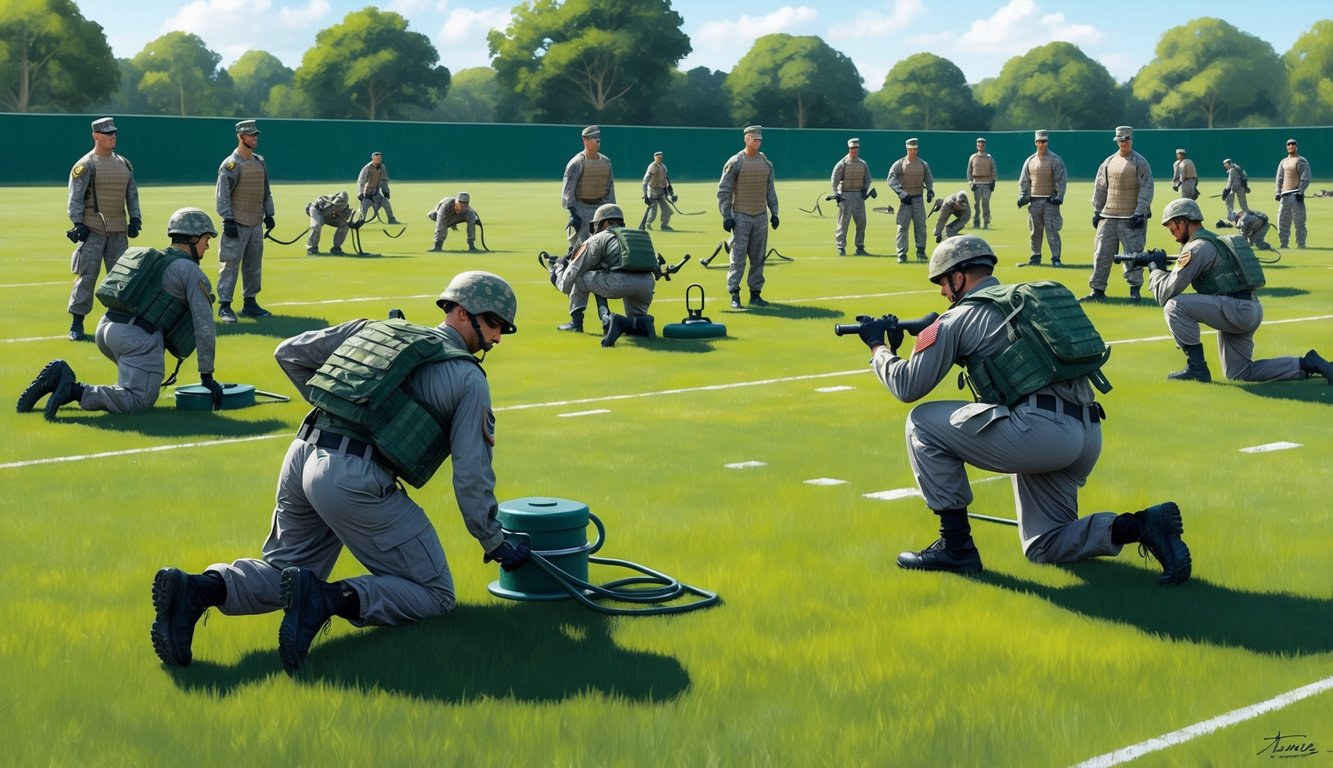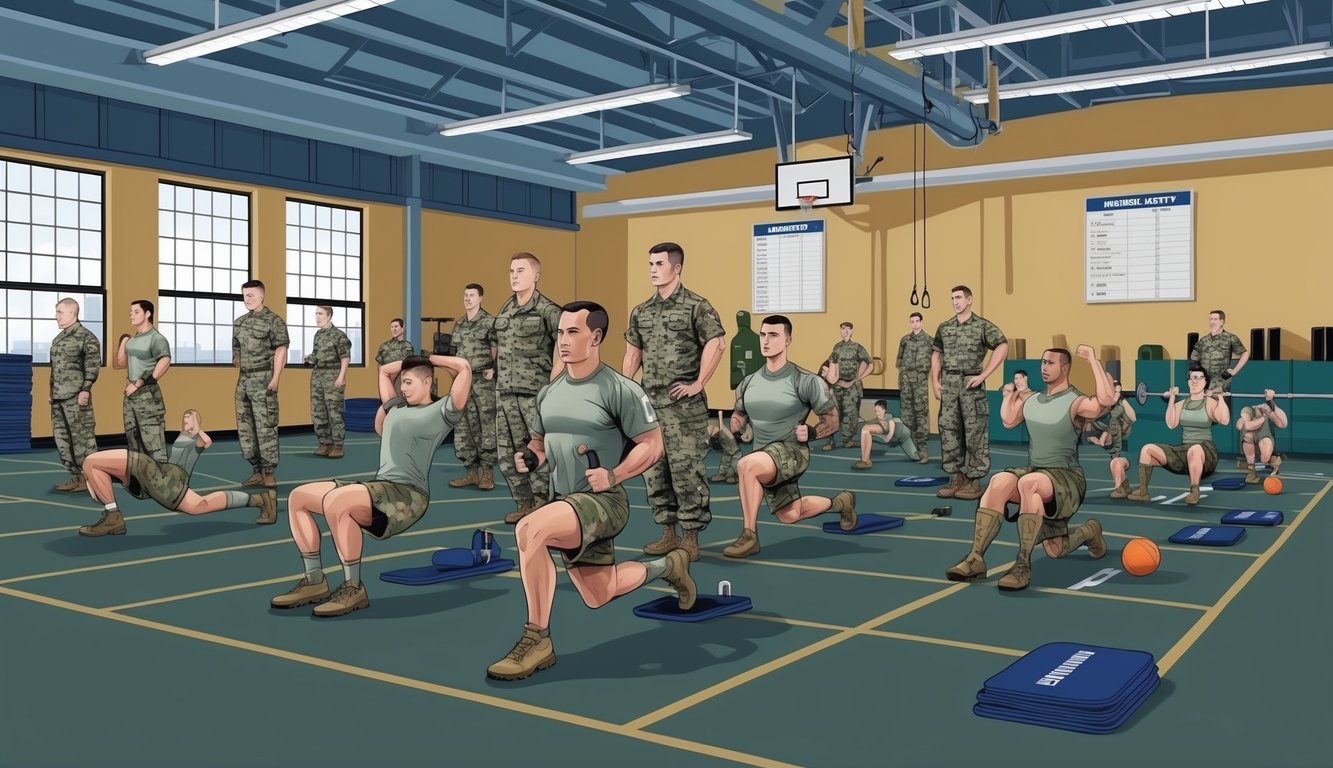The Army Combat Fitness Test (ACFT) has become a vital factor in soldier evaluations and career advancement.
Starting in 2024, the ACFT’s role in awarding promotion points for those aiming to reach the ranks of Sergeant and Staff Sergeant is particularly noteworthy. **The Physical Fitness Test now allows for a maximum of 120 points in promotion considerations for both SGT and SSG, highlighting the significance of physical readiness in developing an Army career.**
The incorporation of the ACFT into the promotion point system necessitates modifications across diverse evaluation categories.
For those aspiring to the rank of Sergeant, these adjustments impact multiple facets of their assessments.
To qualify for ACFT promotion points, soldiers must attain a minimum passing score in each event of the ACFT.
This requirement ensures that only those who meet the Army’s [physical fitness](https://sucharmy.com/best-guides-to-military-fitness-programs/) standards are eligible for promotion.
### Key Takeaways
– The ACFT can contribute up to 120 promotion points for the ranks of Sergeant and Staff Sergeant.
– Soldiers must successfully complete all [ACFT events](https://sucharmy.com/best-military-workout-guides-and-programs/) to earn promotion points.
– The new system aims to balance physical fitness with other performance metrics for soldiers.
### Understanding the ACFT
The Army Combat Fitness Test (ACFT) signifies a major transformation in how the U.S. Army assesses soldiers’ physical readiness.
This thorough evaluation aims to prepare troops effectively for the challenges of [modern warfare](https://sucharmy.com/best-military-survival-guides/).
### History and Purpose
Introduced to replace the previous Army Physical Fitness Test (APFT), which consisted of push-ups, sit-ups, and a two-mile run, the ACFT was developed because the Army recognized that the old test did not adequately reflect the physical demands of combat.
The ACFT was rolled out in 2019 as a more comprehensive measure of soldiers’ fitness, with the aim of reducing injuries, enhancing readiness, and better simulating real military tasks.
After undergoing several revisions, it became the official test of record in 2022.
### Components of the ACFT
The ACFT comprises six diverse events:
1.
Three-Repetition Maximum Deadlift
2.
Standing Power Throw
3.
Hand-Release Push-Up
4.
Sprint-Drag-Carry
5.
Plank
6.
Two-Mile Run
Each event evaluates different fitness aspects essential for military operations.
For instance, while the deadlift measures lower body strength, the power throw assesses explosive power.
Hand-release push-ups gauge upper body endurance, and the sprint-drag-carry replicates battlefield movements.
### Scoring System Overview
The ACFT score operates on a 600-point scale, with 100 points allocated to each event.
Minimum passing scores for each component are established based on age and gender-normed standards.
To pass, soldiers are required to score at least 60 points in every event.
Performance is categorized into tiers:
– Bronze (minimum passing standard)
– Silver (intermediate standard)
– Gold (advanced standard)
– Platinum (elite standard)
The overall score impacts promotion points and can influence career advancement, with higher scores enhancing competitive standing in selection boards and special assignments.
### ACFT Events and Requirements

The Army Combat Fitness Test (ACFT) includes six rigorous events designed to evaluate soldiers’ physical fitness and readiness.
Each event targets specific strength, power, and [endurance](https://sucharmy.com/best-military-ready-to-eat-snacks/) aspects crucial for [military performance](https://sucharmy.com/best-manuals-on-military-training-and-survival-skills/).
#### Deadlift
The Deadlift measures lower body strength and power, conducted with a three-repetition maximum (3RM) using a hex bar.
The minimum passing weight is 140 pounds, with the maximum score achieved at 340 pounds.
Proper form is essential to prevent injury and maximize performance.
Focus on maintaining a neutral spine and driving through the legs during lifts.
#### Standing Power Throw
This event evaluates explosive power and quick force generation by having participants throw a 10-pound medicine ball backward over their heads.
A minimum distance of 6 meters is required for passing, while a maximum score is reached at 12.6 meters.
Best results come from practicing proper technique:
1.
Start with the ball at hip level.
2.
Drop into a quarter squat quickly.
3.
Explosively extend your hips, knees, and ankles.
4.
Release the ball at a 45-degree angle.
#### Hand-Release Push-Up
Assessing upper body muscular endurance, participants perform as many repetitions as possible within two minutes.
A minimum passing score is 10 reps; the maximum is 57.
Key points include:
– Lowering chest and thighs to the ground.
– Lifting hands off the floor at the bottom.
– Returning to the starting position and repeating.
Maintaining a steady pace optimizes scoring.
#### Sprint-Drag-Carry
This event tests anaerobic capacity and muscular endurance through a series of five 50-meter shuttles:
1.
Sprint
2.
Drag a 90-pound sled
3.
Lateral shuffle
4.
Carry two 40-pound [kettlebells](https://sucharmy.com/best-battle-ropes-resistance-bands-and-kettlebells/)
5.
Sprint
Performances should focus on speed maintenance across each shuttle, with practice on transitions to enhance overall time.
#### Plank
The Plank event measures core strength and stability, requiring participants to maintain a forearm plank position for as long as possible.
The minimum time for passing is around 2 minutes, with a maximum score being 4 minutes and 20 seconds.
Proper form includes:
– Keeping the body in a straight line.
– Engaging core muscles.
– Avoiding sagging or raising hips.
Regular practice helps improve endurance and overall scores.
#### Two-Mile Run
The final event assesses aerobic endurance, with participants running two miles on a measured course.
Minimum passing times depend on age and gender, but the general aim is to complete it in under 21 minutes.
For improvement:
– Incorporate interval training into workouts.
– Practice pacing during longer runs.
– Gradually increase distance and speed over time.
### Demographic Considerations

The ACFT [promotion points](https://sucharmy.com/author/sucharmy-staff/) system accounts for various demographic factors to ensure fairness and inclusivity.
Age and gender play significant roles in evaluating and applying scores for promotions.
#### Age Categories
Your age influences how ACFT scores convert to promotion points since the Army recognizes that [physical capabilities](https://sucharmy.com/best-military-fitness-and-training-equipment-pull-up-bars-sandbags-weighted-vests/) change over time.
Age categories are as follows:
– 17-21
– 22-26
– 27-31
– 32-36
– 37-41
– 42+
Each category has tailored standards for the different ACFT events, ensuring soldiers do not compete directly against those who may be significantly older or younger.
As you progress into older age categories, the minimum requirements for maximum points may decrease somewhat, helping ensure experienced soldiers are not penalized in promotions due to natural age-related physical changes.
#### Gender Inclusivity
The ACFT aims for a gender-neutral approach, although certain factors affect promotion points for men and women:
– Uniform standards: Unlike the former Army Physical Fitness Test, the ACFT employs the same events and scoring scales for all genders.
– Performance variances: Generally, men score higher on events like the deadlift and sprint-drag-carry.
– Balancing approach: The Army monitors how these variances influence promotion rates to maintain fairness.
While the test itself maintains neutrality, promotion boards may consider gender representation when assessing scores, fostering diversity in leadership roles.
The objective is to reward physical preparedness without imposing unforeseen barriers for any demographic group.
As you gear up for promotions, concentrate on optimizing your performance within your age category.
### Preparing for the ACFT

To prepare effectively for the ACFT, adopt a holistic method that integrates targeted training, smart [training practices](https://sucharmy.com/best-tactical-load-bearing-equipment/), and [adequate nutrition](https://sucharmy.com/best-body-armor-and-protective-gear/) and recovery.
Focusing on these aspects can enhance your performance across all test events.
#### Training Best Practices
Initiate your ACFT training well ahead of the testing date, ideally 8-12 weeks before the assessment.
Consistency is essential; set a regular workout routine comprising 3-4 training sessions weekly.
Diversify your workouts to engage various muscle groups and energy systems, thereby improving overall performance in all ACFT events.
Track your progress with a fitness app or journal, regularly testing yourself on ACFT events to measure improvement and identify areas needing enhancement.
Don’t overlook flexibility and mobility training.
Incorporate dynamic stretches before and static stretches after your workouts to minimize injury risk and boost performance.
#### Targeted Exercises
Target exercises that directly correlate with ACFT events.
For the 3-repetition maximum deadlift, refine your technique with gradually heavier weights until you reach your target.
To enhance the standing power throw, emphasize explosive movements such as medicine ball throws and plyometrics.
Improve push-ups by integrating various chest and tricep workouts, experimenting with hand placements and tempos to build upper body strength and endurance.
For the sprint-drag-carry, set up a mock course similar to the test to work on transition speed between activities.
#### Nutrition and Recovery
Proper nutrition is key to supporting your training regimen.
Consume a [balanced diet](https://sucharmy.com/best-survival-food-and-mres-meals-ready-to-eat/) rich in lean proteins, complex carbs, and healthy fats.
Ensure adequate hydration throughout the day.
Strategically time your meals by consuming a light meal 2-3 hours before workouts to maintain energy without discomfort.
Prioritize recovery by aiming for 7-9 hours of sleep each night, aiding your body’s repair and strength-building processes.
Utilize [active recovery](https://sucharmy.com/best-camping-gear-tents-sleeping-bags-portable-stoves/) methods like light jogging or swimming on rest days to encourage blood flow and alleviate muscle soreness.
### ACFT Promotion Points System

The Army Combat Fitness Test (ACFT) is integral in determining promotion points for soldiers, offering a thorough evaluation of physical fitness and readiness, significantly affecting career progression opportunities.
#### Calculating Promotion Points
You can earn a maximum of 120 promotion points based on your ACFT results for promotions to Sergeant and Staff Sergeant.
The scoring structure is performance-oriented, with each of the six events contributing to the overall score.
To obtain the highest possible points, aim for the best scores in each event.
The ACFT calculator is a useful tool for tracking progress and estimating potential promotion points.
It is imperative to achieve a minimum passing score across all required events to qualify.
#### Correlation Between ACFT and Promotions
Your performance on the ACFT has a direct correlation with your promotion potential.
Superior scores can substantially enhance your advancement opportunities, particularly in more competitive areas.
Excelling in the ACFT demonstrates your commitment to fitness and Army standards, which can distinguish you from peers during promotion board assessments.
Consistently high ACFT scores may also yield additional chances for leadership roles and specialized training initiatives.
#### Policy Updates and Changes
The Army routinely assesses and modifies ACFT policies to uphold fairness and effectiveness.
As of April 1, 2023, new delegation guidelines for allocating promotion points have been established.
Soldiers with permanent physical profiles are allotted 60 ACFT points for each event they cannot participate in.
This revision aims to foster equity in the promotion process.
Stay updated on policy changes through official Army channels, as these can significantly influence your [promotion strategy](https://sucharmy.com/best-military-medals-and-ribbons/) and career plans.
### Integrating ACFT with Army Career Advancement

The Army Combat Fitness Test (ACFT) is crucial for your career progression within the military, impacting varied aspects of your advancement, from training opportunities to promotion eligibility.
#### Military Training
Your performance on the ACFT can serve as a gateway to specialized training programs; outstanding scores might qualify you for elite courses like Airborne or Air Assault, thereby enhancing your skill set and competitiveness for promotions.
Physical fitness is fundamental to leadership development courses, with strong ACFT results helping you shine within Non-Commissioned Officer Education System (NCOES) programs, providing leverage for climbing ranks.
Regular ACFT preparation boosts overall readiness, rendering you more effective in your current role and better equipped for future opportunities.
#### Education and Civilian Accreditation
While somewhat indirect, the ACFT influences your educational goals.
Keeping fit allows you to concentrate better on academic pursuits without the burden of failing fitness standards.
College credits can potentially be earned for ACFT training and accomplishments, as many institutions recognize military fitness programs as part of their physical education requirements, aiding in faster degree completion and boosting promotion points.
Moreover, some civilian fitness and health certification programs might acknowledge your ACFT scores.
These qualifications can enhance your military career and open avenues for post-service employment.
#### Awards and Decorations
Outstanding ACFT performances can earn you accolades, with the Army Physical Fitness Badge serving as a visible testament to your dedication to fitness.
Unit competitions often incorporate ACFT events, where victories may lead to certificates of achievement or even impact coins, contributing to your promotion points.
For Regular Army and Army Reserve personnel, consistently high ACFT scores factor into end-of-year evaluations, potentially influencing the chances for performance-based awards and furthering your promotion prospects.
### Administrative Aspects of the ACFT

The Army Combat Fitness Test encompasses various administrative elements that ensure fair and uniform execution.
These components include equipment requirements, personnel responsibilities, and accommodations for certain soldiers.
#### Equipment and Facilities
Proper equipment is essential for administering the ACFT.
Each testing location needs:
– 2 x 40-lb kettlebells
– 1 x 10-lb medicine ball
– 1 x measuring tape
– 1 x hex bar with weights
– Pull-up bars
– Sprint-drag-carry lane markers
Testing sites should feature a level field or track for the 2-mile run, while indoor facilities must have space adequate to host all events, including the overhead throw.
#### Role of Graders and Administrators
Graders play a pivotal role in executing the ACFT.
Their responsibilities include:
– Ensuring proper technique and repetition counting
– Accurately recording scores
– Providing instructions and demonstrations
Administrators oversee the entire testing process, with duties such as:
– Scheduling tests
– Coordinating equipment and venues
– Managing grader assignments
– Handling score submissions
Both positions require specific training to uphold test integrity and safety protocols.
#### Handling of Permanent Profiles
The U.S. Army has provisions in place for soldiers with permanent profiles.
If you hold a profile, here’s what you need to know:
– You receive 60 points for each event you cannot participate in.
– Alternative events may be assigned based on the specifics of your profile.
– Profile-related accommodation needs approval from your commander.
Soldiers with profiles still must meet the minimum fitness requirements for their designated duties.
Individual assessments ensure fairness while maintaining readiness across the board.
### ACFT for Special Populations

While the Army Combat Fitness Test applies broadly to all soldiers, specific groups may encounter unique challenges.
Adjustments are in place for reserve components and injured soldiers to ensure overall readiness across the force.
#### ACFT Readiness for Reserve Components
As a member of the Army Reserve or National Guard, you may face distinct challenges in preparing for the ACFT, given limited training time and equipment access.
To support your readiness, the Army has introduced several strategies:
1.
Virtual training modules
2.
Mobile ACFT equipment kits
3.
Flexible drill schedules
These initiatives help you maintain fitness despite restricted in-person training.
The USAR (AGR) program offers additional backing, ensuring Active Guard Reserve soldiers can achieve the same standards as their active-duty peers.
Supplementing physical training, computer training programs allow you to learn correct form and techniques from home.
#### Adaptive Training for Injured Soldiers
If you’re rehabilitating from an injury, the Army offers adaptive training solutions to sustain your soldier readiness.
These include:
– Modified exercises tailored to your injury.
– Temporary profiles with adjusted ACFT requirements.
– Rehabilitation programs that align with ACFT preparation.
Military education courses now integrate adaptive fitness training to ensure you remain on track for promotions during your recovery phase.
### ACFT Norms and Statistics

The Army Combat Fitness Test utilizes a normed scoring system to assess soldiers’ physical fitness, implying that your performance is compared to others within your age and gender category.
ACFT passing scores differ based on your military occupational specialty (MOS), with a general requirement to achieve at least 60 points per event.
With a maximum score of 100 points per event, the total achievable score is 600.
Scoring above the 90th percentile within your demographic can earn you maximum promotion points.
### Here’s a quick scoring tier overview:
– **Bronze**: 60-69 points
– **Silver**: 70-79 points
– **Gold**: 80-89 points
– **Platinum**: 90-100 points
Your ACFT score substantially affects your promotion possibilities, especially with promotion points being issued based on performance as of April 1, 2023.
To enhance your promotion chances, focus on consistently high scores throughout all events.
Prioritize improvement in areas of weakness while maintaining strength in others.
### Advancements and Future of the ACFT

The Army Combat Fitness Test continues to evolve, with recent modifications affecting promotion points and implementation schedules.
These updates aim to better evaluate soldiers’ physical readiness and align with the Army’s holistic health and fitness (H2F) approach.
#### Recent Developments
Since its rollout, the ACFT has seen significant adjustments.
You’ll notice a reduction in the maximum promotion points awarded for physical fitness from 180 to 120 for those seeking the sergeant rank.
This modification promotes a more integrated evaluation of soldiers’ comprehensive capabilities.
Promotion awards have also raised in importance, now increasing from 125 to 145 points, recognizing accomplishments beyond mere physical fitness.
The assessment itself is subject to continuous refinement; you may observe changes to exercise standards or scoring methodologies as data and feedback guide the Army’s improvements.
#### Implementation Timeline and Expectations
The ACFT was designated the Army’s official physical fitness test on October 1, 2022.
Anticipate ongoing updates and modifications as the evaluation method matures.
If you have a temporary profile, scoring for promotion purposes might still occur during specific testing windows, preventing undue disadvantage during recovery.
Looking ahead, expect:
– Advanced integration of H2F principles in ACFT preparation.
– Potential adjustments to the allocation of promotion points.
– Increased emphasis on aerobic endurance elements.
### Frequently Asked Questions
The ACFT promotion points system can seem complex.
Below are common inquiries that clarify essential scoring, calculations, and the impact on career progression.
#### How can I calculate my promotion points from my ACFT score?
Your ACFT score directly correlates with your promotion points.
Each event is worth up to 100 points, leading to a maximum total of 600 points.
The raw score translates into a percentage that determines your promotion points.
For instance, scoring 540 out of 600 yields 90%, likely equating to 108 out of 120 promotion points for physical fitness.
#### What is the current ACFT score to promotion points conversion table for 2024?
The 2024 conversion table follows a similar structure to earlier years.
A perfect score of 600 on the ACFT earns you 120 promotion points, while scores between 540 and 599 typically earn between 108 and 119 points.
Lower scores still contribute; ranges between 420 and 479 generally yield 60-89 points.
Keep in mind that these figures may fluctuate somewhat based on Army updates.
#### Is there a difference between APFT and ACFT promotion points?
Yes, there is a notable distinction.
The APFT involved three events, whereas the ACFT includes six, resulting in a fuller assessment of your physical fitness.
The ACFT also provides a wider range of potential points, more accurately reflecting the diverse physical demands of contemporary soldiering, which can in turn affect promotion opportunities differently than the APFT.
#### What’s a good ACFT score to aim for if I’m looking to get promoted?
To position yourself favorably for promotion, target a minimum score of 540 out of 600 on your ACFT, which typically secures over 100 promotion points.
Consistently scoring above 550 demonstrates exceptional fitness and dedication, setting you apart during promotion evaluations.
#### How are promotion points affected by my Army weapons qualification scores?
Weapons qualification scores are assessed separately from your ACFT scores.
They can contribute up to 40 additional points to your total promotion points.
Achieving expert qualification typically earns the full 40 points, while Sharpshooter and Marksman qualifications yield fewer.
These scores accumulate alongside your ACFT results, enhancing overall promotion prospects.
#### Where can I find an updated ACFT score chart for promotion point assessment?
The latest ACFT score charts are accessible on the official Army website, in your unit’s S1 office, or through your chain of command.
For the most accurate and current details, always refer to official Army resources.
These charts undergo periodic updates, so regular checks will keep you informed regarding how your scores convert to promotion points.

